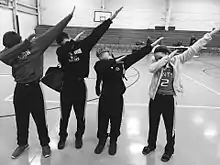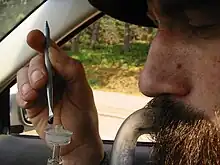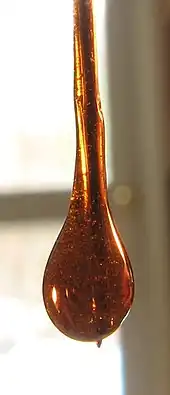dab
English


Pronunciation
- IPA(key): /dæb/
Audio (US) (file) - Rhymes: -æb
Etymology 1
From Middle English dabben (“to strike”), probably of North Germanic origin, related to Old Icelandic dabba (“to tap, slap”), perhaps ultimately imitative.[1] Compare also with Middle Dutch dabben (“to pinch, knead, fumble, dabble”) (Dutch dabben (“(of a horse) to stamp with the forelegs”)), Dutch deppen (“to dab”), possibly German tappen (“to fumble, grope”).
The noun is from Middle English dabbe (“a strike, blow”), from the verb. Related to tap. Compare also drub, dub.
African-American sense of “playful box” perhaps influenced by dap (“fistbump”).
Verb
dab (third-person singular simple present dabs, present participle dabbing, simple past and past participle dabbed)
- (transitive) To press lightly in a repetitive motion with a soft object without rubbing.
- I dabbed my face with a towel.
- (transitive) To apply a substance in this way.
- He dabbed moisturizing liquid on his face.
- To strike by a thrust; to hit with a sudden blow or thrust.
- 1532-1533, Thomas More, The Confutation of Tyndale's Answer
- to dabbe him in the necke
- 1532-1533, Thomas More, The Confutation of Tyndale's Answer
- (slang) To apply hash oil to a heated surface for the purpose of efficient combustion.
- (dance, intransitive) To perform the dab dance move, by moving both arms to one side of the body parallel with your head.
Translations
Noun

dab (plural dabs)
- A soft tap or blow; a blow or peck from a bird's beak; an aimed blow.
- 1865, Charles Dickens, Our Mutual Friend:
- I promise you nothing,' said the dolls' dressmaker, dabbing two dabs at him with her needle, as if she put out both his eyes.
- 1917, Robert Hichens, In the Wilderness:
- Then the minute feet made feeble dabs, or stabs, at the atmosphere; the tiny fists doubled themselves and wandered to and fro as if in search of the enemy.
- (African-American Vernacular) A soft, playful box given in greeting or approval.
- A small amount, a blob of some soft or wet substance.
- Synonym: blob
- a dab of glue
- (slang) A small amount of hash oil.
- (chiefly in the plural, dated, British) Fingerprint.
- 2022, Liam McIlvanney, The Heretic, page 132:
- One had Glash's dabs on it and a half-inch of Macallan at the bottom.
- (dance) A hip hop dance move in which the dancer simultaneously drops the head while raising an arm, briefly resting their face in the elbow, as if sneezing into their elbow.
- (obsolete) A dabbler.
Descendants
- Irish: daba
Translations
See also
Etymology 2
Perhaps corrupted from adept.
Noun
dab (plural dabs)
- One skilful or proficient; an expert; an adept.
- Synonyms: see Thesaurus:skilled person
- c. 1759-1770?, Oliver Goldsmith, Essay
- One excels at a plan or the title page, another works away at the body of the book, and the third is a dab at an index.
- 1791-92, Jane Austen, ‘A Collection of Letters’, Juvenilia:
- Indeed I had always heard what a dab he was at a Love-letter.
Derived terms
Translations
Etymology 3
Late Middle English dabbe, of unknown origin; perhaps related to sense 1 (“to press against lightly”) as in "a soft mass dabbed down."[2]
Noun
dab (plural dabs)
- A small flatfish of the family Pleuronectidae, especially Limanda limanda; a flounder.
- (US) A sand dab, a small flatfish of genus Citharichthys.
Descendants
- → Irish: daba
Translations
Etymology 4
Back slang for bad.
Adjective
dab (comparative more dab, superlative most dab)
- (obsolete, costermongers) Bad.
- 1851, Henry Mayhew, “Habits and Amusements of Costermongers”, in London Labour and the London Poor, volume 1, page 11:
- Business topics are discussed in a most peculiar style. One man takes the pipe from his mouth and says, "Bill made a doogheno hit this morning." "Jem," says another, to a man just entering, "you'll stand a top o' reeb?" "On," answers Jem, "I've had a trosseno tol, and have been doing dab."
- 2012, Anthony Quinn, The Streets, →ISBN, page 33:
- One afternoon, arriving at his stall later than usual, I said, almost unknowingly, 'A doogheno or a dabheno?' Jo, who had often chaffed me for my awkward mimicking of coster language, didn't even look up from peeling his apple. 'Dab,' he said, with a little shake of his head.
References
- Douglas Harper (2001–2024) “dab”, in Online Etymology Dictionary.
- Skeat, W. W. (2013). An Etymological Dictionary of the English Language. United States: Dover Publications, p. 152
Further reading
 dab on Wikipedia.Wikipedia
dab on Wikipedia.Wikipedia  dab (dance) on Wikipedia.Wikipedia
dab (dance) on Wikipedia.Wikipedia - Oxford English Dictionary (1989)
- “dab”, in OneLook Dictionary Search.
Dutch
Pronunciation
- IPA(key): /dɛp/
Audio (file) - Hyphenation: dab
- Rhymes: -ɛp
Related terms
Indonesian
Pronunciation
- IPA(key): [ˈdap̚]
- Hyphenation: dab
Noun
dab (first-person possessive dabku, second-person possessive dabmu, third-person possessive dabnya)
- dub: the replacement of a voice part in a movie or cartoon, particularly with a translation; an instance of dubbing.
Derived terms
- mengedab
- pengedaban
Etymology 2
From Arabic ضَبّ (ḍabb), from Proto-Semitic *ṣ́abb-.
Noun
dab (first-person possessive dabku, second-person possessive dabmu, third-person possessive dabnya)
Etymology 3
(This etymology is missing or incomplete. Please add to it, or discuss it at the Etymology scriptorium.)
Noun
dab (first-person possessive dabku, second-person possessive dabmu, third-person possessive dabnya)
- a kind of mat measuring approximately 2 m, made of woven pandan leaves that are connected by stitching
Further reading
- “dab” in Kamus Besar Bahasa Indonesia, Jakarta: Agency for Language Development and Cultivation – Ministry of Education, Culture, Research, and Technology of the Republic of Indonesia, 2016.
Maltese
| Root |
|---|
| d-w-b |
| 10 terms |
Alternative forms
Pronunciation
- IPA(key): /daːp/
Somali
References
- Abdirahman Abdillahi Farah "Barwaago" (1995) “dab”, in A Modern Somali-English Dictionary, Ottawa: Ottawa Catholic School Board, →ISBN, page 89
- Puglielli, Annarita, Mansuur, Cabdalla Cumar (2012) “dab”, in Qaamuuska Af-Soomaliga, Rome: RomaTrE-Press, →ISBN, page 167
Sumerian
White Hmong
Pronunciation
- IPA(key): /da˥/
Etymology 1
From Proto-Hmong-Mien *qlaŋ (“neck”); related to Old Chinese 頸 (OC *keŋʔ, *ɡeŋ, “neck”).[1]
Etymology 2
From Proto-Hmong *qraŋᴬ (“spirit, ghost”).[2]
Noun
dab
Derived terms
Etymology 3
From Proto-Hmong *qroŋᴬ (“trough”).[2]
Derived terms
- dab dej (“a trough for holding water”)
- dab nees (“a horse feeding trough”)
- dab npua (“a trough for pig food”)
- dab zaub (“a trough for putting vegetable greens in”)
References
- Ratliff, Martha (2010) Hmong-Mien language history (Studies in Language Change; 8), Camberra, Australia: Pacific Linguistics, →ISBN, page 260; 273.
- Ratliff, Martha (2010) Hmong-Mien language history (Studies in Language Change; 8), Camberra, Australia: Pacific Linguistics, →ISBN, page 273.
Yola
Alternative forms
Etymology
From Middle English dabben.
Pronunciation
- IPA(key): /dab/, /dap/
Noun
dab
References
- Jacob Poole (d. 1827) (before 1828) William Barnes, editor, A Glossary, With some Pieces of Verse, of the old Dialect of the English Colony in the Baronies of Forth and Bargy, County of Wexford, Ireland, London: J. Russell Smith, published 1867, page 33